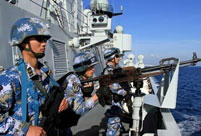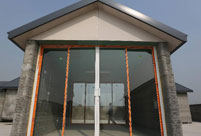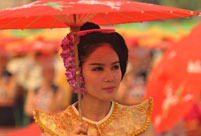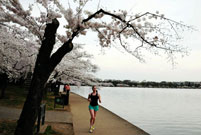 Cherry blossoms reach peak bloom in Washington D.C.
Cherry blossoms reach peak bloom in Washington D.C.
 Top Chinese fashion icons in foreigners' eyes
Top Chinese fashion icons in foreigners' eyes
 Asia's largest business aviation exhibition to be held in Shanghai
Asia's largest business aviation exhibition to be held in Shanghai
 World's top-rated luxury hotels
World's top-rated luxury hotels
 Wu Jing, Xie Nan to hold wedding on May
Wu Jing, Xie Nan to hold wedding on May
 London Cake International attracts tourists
London Cake International attracts tourists
 Let's dance in harmonic Shaanxi
Let's dance in harmonic Shaanxi
 Christie's to auction dazzling diamonds
Christie's to auction dazzling diamonds
 'Model husband' shatters image of love
'Model husband' shatters image of love
 Can animals smile? Or put on a happy face
Can animals smile? Or put on a happy face
SEOUL, April 16 -- Senior diplomats of South Korea and Japan started talks Wednesday about Japan's wartime sexual enslavement of Korean women ahead of U.S. President Barack Obama' s visit to the two countries next week.
Junichi Ihara, head of Japanese Foreign Ministry's Asian and Oceanian Affairs Bureau, arrived in Seoul to meet with Lee Sang- deok, director general of South Korean Foreign Ministry's Northeast Asian Affairs Bureau.
It was the first time South Korea and Japan held talks about the comfort women, a euphemism for Korean women coerced into sexual slavery for the Japanese Imperial Army during World War Two.
The diplomats reportedly planned to hold a marathon dialogue and a dinner session, as differences on the comfort women issue remained between the two countries.
Advocate groups for the former sex slaves have demanded that the Japanese government acknowledge its legal responsibility for the wartime crime.
In the 1990s, Japan set up the so-called Asian Women's Fund, a private-public fund to compensate for former sex slaves in Asia, but many South Korean victims refused to take money as it did not directly come from the Japanese government.
Japan has claimed all issues related to the wartime atrocities, including the comfort women issue, were resolved under the 1965 treaty that normalized the diplomatic relations between the two nations.
Among 237 South Korean women who identified themselves as former sex slaves, only 55 are still alive.
The United States has pressed its two close Asian allies to mend ties ahead of Obama's visit to Japan and South Korea. Obama is scheduled to arrive in Seoul on April 25 for a two-day visit after staying in Tokyo for three days.
South Korean President Park Geun-hye has refused to meet one-on- one with Japanese Prime Minister Shinzo Abe since her inauguration in February last year as ties between Seoul and Tokyo have been strained since Abe returned to power in December 2012 due to Abe' s wrong perception of history and territorial dispute over the islets, known as Dokdo in South Korea and Takeshima in Japan, lying halfway between the two nations.
The relations worsened after Abe paid a visit in December last year to the controversial Yasukuni Shrine, which honors 14 convicted Class-A war criminals.
 A bite of China II whets the appetite
A bite of China II whets the appetite Chinese frigate completes its 14th escort mission
Chinese frigate completes its 14th escort mission Let's dance in wealthy Shaanxi
Let's dance in wealthy Shaanxi A date with 798: feel the art around you
A date with 798: feel the art around you 3D-printed houses built in Shanghai
3D-printed houses built in Shanghai World largest scale of umbrella dance
World largest scale of umbrella dance Cherry blossoms reach peak bloom in Washington D.C.
Cherry blossoms reach peak bloom in Washington D.C. Red terraced fields in Dongchuan of Yunnan
Red terraced fields in Dongchuan of Yunnan Presentation ceremony of 33rd Hong Kong Film Awards
Presentation ceremony of 33rd Hong Kong Film Awards The backstage of the Fashion Week
The backstage of the Fashion Week College students in Han costumes
College students in Han costumes Postgraduate works as waitress
Postgraduate works as waitress Life in a Lahu village in Yunnan
Life in a Lahu village in Yunnan An orphan’s wedding
An orphan’s wedding Hollywood documentary brings Diaoyu Islands truth to new audience
Hollywood documentary brings Diaoyu Islands truth to new audienceDay|Week|Month